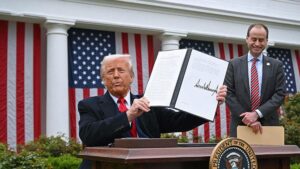Israel could play a key role in regional efforts to combat climate change, U.S. climate envoy John Kerry told Haaretz on Wednesday, praising the country’s “remarkable capacity for innovation.”
“Israel could be extraordinarily helpful in assisting other countries in the region” with developing “environmentally sustainable agricultural practices,” Kerry said in a prerecorded interview with Editor In Chief Aluf Benn broadcast during the Israel Climate Change Conference in Jerusalem.
Not just Ukraine: ‘Putin uses Iran to make America look weak.’ LISTEN
Kerry also cited Israel’s standing as a “technology powerhouse,” noting a recent deal brokered by the United Arab Emirates and the United States in which Jordan and Israel agreed to exchange desalinated water and renewable solar energy.
U.S. special Envoy for Climate John Kerry during a video interview alongside Haaretz Editor In Chief Aluff Benn, on Wednesday. Ohad Zwigenberg
“So I think Israel could play a key role here and what we need to do here is raise the ambition of every country in the region to reduce their emissions,” Kerry said.
During the interview, the former Obama administration secretary of state declared that the world only has a decade to head off the worst effects of climate change but that the crisis can be solved with sufficient political will.
While “powerful interests” such as the gas, oil and coal industries have stood in the way of change, it is human nature to prefer the status quo, “hunker down, ignore reality and not allow facts to affect decision-making,” he said, citing “years of denial” of the severity of the problem.
But at the end of the day, “it’s not about ideology or politics, it’s about physics and mathematics,” he stated.
Israel will get much hotter by 2050, heat waves will increase, expert prediction finds
The people who fight climate change from beyond the grave
Tel Aviv, Eilat saw more rain in one month than annual average
Asked if current international tensions could stand in the way of cooperation on climate issues, Kerry praised recent bilateral steps taken by the U.S. and China and invoked the example of Republican President Ronald Reagan who, while declaring the Soviet Union an “evil empire,” also negotiated with Moscow to significantly reduce both countries’ nuclear arsenals.
Environmental Protection Minister Tamar Zandberg speaks to a panel at the Israel Climate Change Conference on Wednesday.Ohad Zwigenberg
“It requires strong leadership and obviously it requires an element of compartmentalization,” he explained, citing Israel’s ability to forge security relationships and cooperation in the region, even if such ties have not always been publicly acknowledged.
Organized by Haaretz and Hebrew University, the Israel Climate Change Conference in Jerusalem is being held just three months after the International Climate Conference in Glasgow amidst a growing public debate on the climate crisis in Israel.
The conference includes interviews with top decision-makers, activists and international experts – including Israeli President Isaac Herzog and Environmental Protection Minister Tamar Zandberg – and is focused on seeking forward-looking solutions and options for emerging from the climate crisis.
While most discussions and speeches are in Hebrew, one panel, slated to take place at 11:20 A.M., is in English: a discussion on how climate change is impacting the Middle East, and whether it will lead to more wars and violence in the region, or create opportunities for cooperation. Haaretz journalist Amir Tibon will present this question with Gidon Bromberg, Israel director at EcoPeace, and officials from Israel, the Palestinian Authority, Cyprus and Slovenia, will share their own government’s efforts to tackle the local and regional aspects of climate change.





